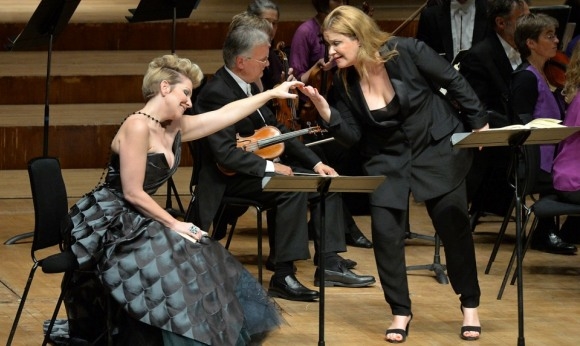
© Mark Allan/Barbican
Alice Coote has apparently come in for some flak of late for her Handel singing, which seems extraordinary given her considerable achievements in this repertoire. Here her ferociously good Ruggiero was joined by a playful Christine Rice (Bradamante), a noticeably pregnant and flirty Anna Christy (Morgana) and, among the brightest of today’s younger singers, Ben Johnson and Anna Devin (Oronte and Oberto).
As the witch Alcina, the third mezzo of the evening was one of opera’s true stars, Joyce DiDonato, in a role normally sung by a soprano. Sporting a fearsome haircut and flouncy dress which shed bits by the act, DiDonato made each of her six arias (two in each act) a showstopper. She has a rare combination of vocal beauty, complete focus and a commanding presence that puts her in the company of the best in any age. It was an utterly riveting performance that kept a rapt audience on the edge of its seat over a four-hour evening.
The other principals (completed by bass Wojtek Gierlach) each had moments to shine – Coote in her final aria "Sta nell’Ircana" and Devin in "Barbara!" were outstanding moments among many highlights – and Harry Bicket‘s English Concert supported the singers superbly. There was some tremendous solo work, with Joseph Crouch‘s expressive cello accompaniment particularly noteworthy.
'Altogether an astonishing evening'
Alcina, like the preceding Orlando and Ariodante, was based loosely on Ariosto’s Orlando Furioso and involves a typically convoluted and fantastical plot, with sorcery, shape-changing and cross-gender disguise driving the plot. Despite these conventions, which can make Handel’s opera stories seem pretty distant, his genius in this wondrous work thunders across the centuries, as it dwells on issues that still concern us (or should do) on a daily basis. Handel has never seemed so modern.
When Ruggiero, played with characteristic intensity by Coote, struggles with the dilemma of trying to distinguish truth from lies in "Mi lusinga il dolce affetto", it speaks less today of sorcerers and spells and more about the dangers we face as modern media makes it increasingly difficult to separate manipulation and trickery from the genuinely virtuous. Malevolence masquerades as social good and we all have to be on our guard, something Coote’s Ruggiero pinpointed perfectly during this and his following aria, "Mio bel tesoro", in which he speaks the truth while practicing a little deceit of his own.
The singers carried scores but weren’t at all bound to them, in performances as committed as if they’d been lifted straight from the stage. Altogether an astonishing evening that will live long in the memory.












